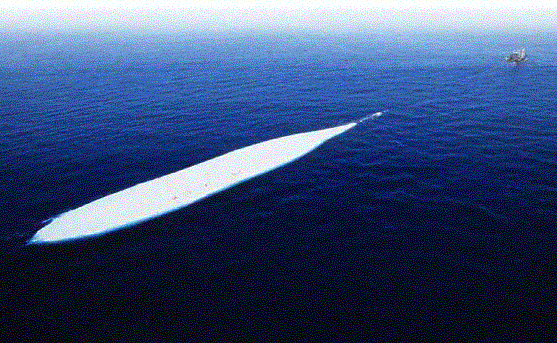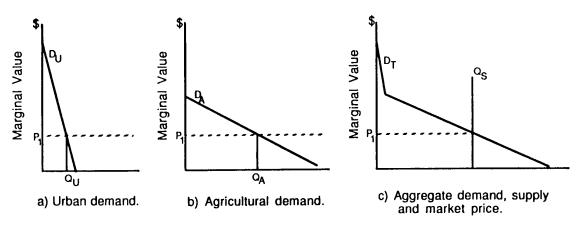International Water Marketing -- Canada
David Kracman
July 5, 2001
Introduction
While the world supply of fresh water is abundant, and easily large enough to meet human demands for many years, regional water scarcity is already common today. One method for alleviating the distribution problem is international water marketing, where water would be transported from places with water surplus to those areas experiencing shortages.

Figure 1: 30,000 Tonne Waterbag (source -- Nordic Water Supply ASA)
If international water markets do develop, one country likely to be a focus of attention is Canada. With 20% of the world's fresh water, Canada could potentially export huge quantities of freshwater around the globe. Already, a proposal is in the works to sell water from Newfoundland's Gisborne Lake to other countries -- primarily the U.S. If the plan goes through, some experts believe it will open the floodgates to Canadian bulk water exports through NAFTA-protected exchanges. Other experts allege that it is a non-issue, since tanker transport of fresh water tends to be several times more expensive than desalination of ocean water.
U.S. interest in Canada's water resources is not new. In the late 1940's, the Bureau of Reclamation conducted a grandiose study known as the United Western Investigation, which included proposals to divert Canadian rivers across the continent for augmentation of the United States' Colorado River. More recently, Sun Belt Water Inc., out of Santa Barbara, California, attempted to ship water from British Columbia to international markets using reconfigured supertankers. While Sun Belt's license was revoked before pumping began, the company is now suing the Canadian government through a NAFTA arbitration panel. In addition, several proposals have been introduced to ship water from the Great Lakes to water scarce areas in Asia.
What is a Water Market?
A water market is a reallocation of water in which the value of the water is considered independent of the value of land and improvements, buyers and sellers participate voluntarily, and terms of the sale, including the price, are decided by the buyer and seller. (Saliba 1987, pg. 3,4). An example of a market for water, here between agricultural and municipal demands, is shown below.

Figure 2: Theoretical Water Market (Source -- Saliba 1987)
Water markets exist in many countries across the globe, including the U.S., Chile, Mexico, and Argentina. These markets tend to be only national in scope, however, with exchanges occurring within a single country. Transportation of bulk water (bottled water is an exception) outside political boundaries via a market exchange is rare, but does already take place in certain areas. Austria and Turkey export water to Mediterranean countries and Israel, respectively, profiting from sales to areas with extreme water scarcity problems. The Bahamas and Cyprus also import water from outside sources.
Canada Wet Incorporated and Gisborne Lake
On September 9, 1999, Oliver Langdon, the Minister of Environment and Labour for the Government of Newfoundland and Labrador, announced his acceptance of an environmental impact statement for bulk water export of water from Gisborne Lake. Canada Wet Incorporated, a division of the McCurdy Group of Companies based in Gander, Newfoundland, has proposed to pump 500,000 cubic meters (400 acre-feet) per week, or about 25 million cubic meters (20,000 acre-feet -- the volume of Lake Austin) per year from the Newfoundland lake, and ship the water to foreign markets. A nationwide ban on bulk water export has stopped the plan for now, but the new premier of Newfoundland, Roger Grimes, has indicated that he may revoke the ban for the province. Some trade experts predict that if that happens and bulk sales begin, the other Canadian provinces will also be opened up to water exportation because of NAFTA trade provisions.
The debate concerning Canadian water exportation goes to the heart of how water is viewed -- either as a commodity or as a basic human right. There appears to be a danger in the extremes of either position, since disregarding the monetary attributes of water tends to lead to wasteful and inefficient use, while focusing too much on its economic value can result in exploitation by those concerned only with profiting from others' deficiencies. In transboundary water issues, water marketing could provide flexibility in handling water apportionment between riparians, but could also result in exporting riparians (upper riparians in the case of transboundary rivers) overcharging for their water deliveries.
QUESTIONS
· Should water ever be exported outside of the boundaries of a watershed? Outside of national boundaries?
· What are the risks involved with potential exploitation of water should international water markets become widespread?
· Is water marketing incompatible with the concept of water as a basic human right?
· In river basins with upper and lower, or co-riparians, how could water markets be used to create flexible allocation structures better able to meet changing demands than rigid treaties?
REQUIRED READING
O'Malley, Martin and Bowman, John. "The Future of Canada's Water." CBC News, June, 2001. http://cbc.ca/news/indepth/water/
Baglole, Joel. "Storm Brews Over Plan to Export Canadian Water to U.S." Wall Street Journal, April 11, 2001. www.ce.utexas.edu/stu/kracmadr/canada.bmp
SUPPLEMENTARY READING
Kracman, David, "Liquid Capital: Water Marketing in the Twenty-First Century", 2001 (awaiting fall 2001 publication) www.ce.utexas.edu/stu/kracmadr/CRP387CPaper.pdf
Gleick, Peter H. "Approach 2, Redistribute Supplies: Bagged and Dragged." Scientific American, February, 2001. www.scientificamerican.com/2001/0201issue/0201how.html#2
Geddes, John. "Should Canada Sell its Water?" Maclean's, March 6, 2001. www.cquest.utoronto.ca/env/env234y/bht/water.html
Canadian Environmental Law Association, "Beyond Levels and Flows: Sustaining the Great Lakes in the Next Millennium." March 5, 1999. www.cela.ca/water/bg-ijc.htm
Saliba, Bonnie Colby and Bush, David B. Water Markets in Theory and Practice: Market Transfers, Water Values and Public Policy. Boulder: Westview Press, Inc., 1987.
Ed. Note: The above article was written by David Kracman as part of graduate studies and the University of Texas at Austin. His views are strictly his own and do not necessarily represent the views of WaterBank®.